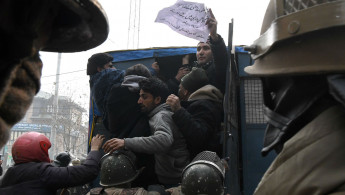The betrayal of India's human rights organisations
They are statutory bodies for the protection of human rights. However, they have been provided with the power to report and investigate human rights violations, but lack the power to prosecute and punish criminals.
To encourage punitive measures, they have always depended on the state to back their investigations.
"The National Human Rights Commission (NHRC) and State Human Rights Commissions (SHRC) need force from the state, but it would be legally inappropriate for them to depend upon the police to carry out an impartial investigation - more particularly when some of the latter's own personnel are said to be involved in violations", said Dr Aijaz Ashraf Wani, an academic at Kashmir University.
Questions have also been raised over the independence of these commissions, as they seem to be driven by political motives more often than not.
"The role of NHRC has not been pro-active in safeguarding human rights. NHRC has never been an independent body; rather it is very much political which state uses for its own gains," said Farukh Faheem, an assistant professor who teaches about social movements.
Hafsa Rafiq Khan, a researcher working with Jammu Kashmir Coalition of Civil Society (JKCCS) added: "The Supreme Court of India, the apex judicial body, has rightly called the NHRC a 'toothless tiger' because it has more or less been the handiwork of the ruling party which tries to brush up grave human rights issues. It has failed to deliver at both central and state level."
The Supreme Court had once described NHRC as the "protector, advisor, monitor and educator of human rights", whereas now it has become "a toothless tiger" for its failure to check alleged violation of human rights in Manipur.
"Undoubtedly, the protection and preservation of human rights is one of the most important aspects of the rule of law," said the court. A lack of trained staff and the non-compliance of states to provide reports into unexplained delays in inquiries has led to its ineffectiveness.
A major problem faced by these institutions is a lack of backing by the judiciary. "Despite claiming to be a quasi-judicial body with the mandate to investigate human rights abuses, such bodies tend to deny the severity of violence especially which directly involves the state," said Idrees Kanth, a Kashmiri historian at University of Leighden.
Parvez Imroz, a noted human rights lawyer and recipient of Norway's Rafto Prize for Human Rights said "the judiciary in Kashmir isn't very effective to issues related to human rights which makes these commissions a flop-show".
 |
| Human rights group have been restricted by new laws [AFP] |
He further said that "the human rights institutions can't be seen in isolation, rather they have to be seen differently in conflict areas like Kashmir as compared to other states of the Indian Union. The powers of judges haven't been curtailed but they aren't assertive."
These bodies are subordinate to central and state governments. "NHRC is not independent enough to prosecute the army or paramilitary troops because to prosecute them NHRC would require permission from Home Ministry which never comes," said Dr Aijaz Ashraf Wani.
Naeemullah is a law graduate. "Human rights commissions work at par with other state institutions which is what makes us not to expect that these commissions can be impartial and fair in relation to the human rights violations committed by the state itself," he said. "Particularly in relation to state of Jammu and Kashmir where in 85 percent of the cases SHRC had asked for reports from other state institutions, and they were not given."
In 2017, Farooq Ahmed was used by armed forces as human shield in Kashmir, tying him to their vehicle, to detract prospective protests in an area holding elections. The SHRC asked the government to offer compensation to the victim, which the state government refused. Instead, the central government gave the perpetrator, Major Gogoi, an award for bravery.
Haroon Lone is an analyst working in Kashmir



